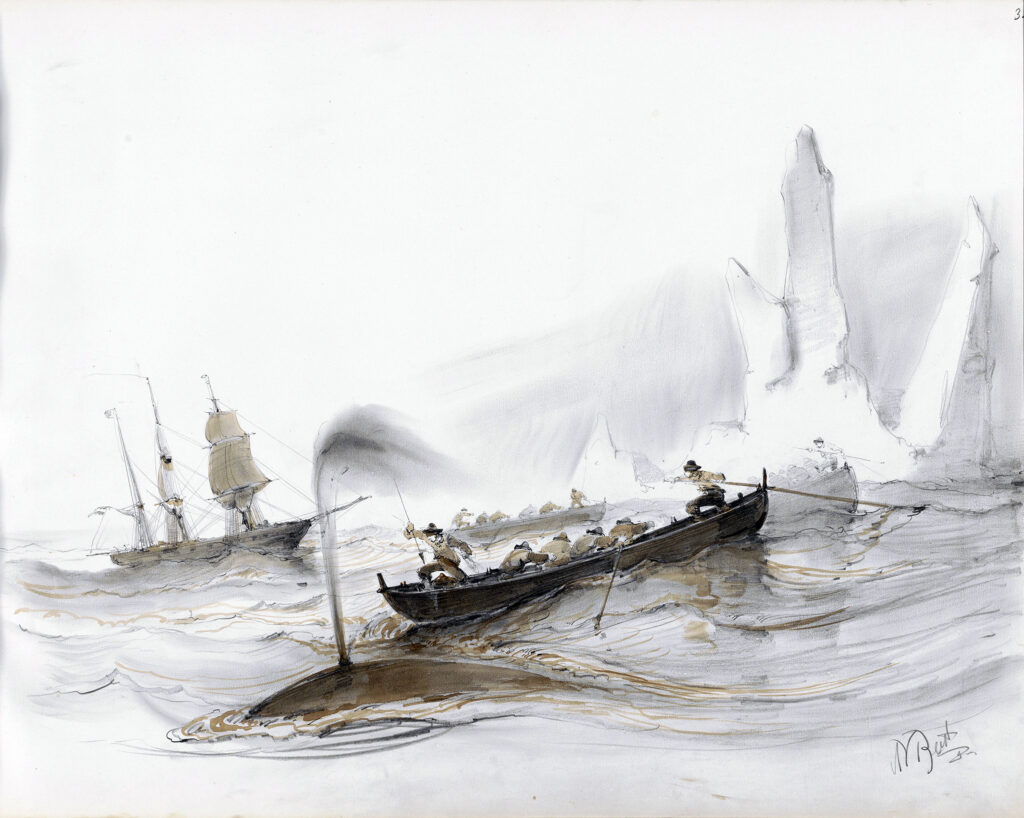30 June 1866: The crew of the Diana of Hull kill and process two right whales – a small fortune – in Melville Bay, off northwestern Greenland

Sketch of whalers by an ice floe by the Dutch marine realist Albertus van Beest, who lived in the whaling port of New Bedford, Massachusetts, in the 1850s (Beest 1855ish).
Charles Edward Smith. 1922. From the Deep of the Sea. Ed. Charles Edward Smith Harris. London: A. and C. Black. Get it:
.Unedited excerpt
If an excerpt is used in the book, it will be shorter, edited and, where applicable, translated.
This day ought to be marked on our calendar “with a white stone,” as the Romans phrased it [i.e. a lucky day].
At 2 a.m. a whale was seen, and three boats sent away in pursuit. At four o’clock the ship resounded with the cry, “A fall! a fall!” All hands rushed on deck in their shirts and pants and crowded into the other boats, which were instantly lowered and put off in a state of the greatest excitement. Bill Reynolds was fast to a fish at the floe edge some 200 yards from the stern of the ship.
I ran along the floe and stood in the bows of the boat. The line was running out very fast, the fish having gone under the floe. The boat’s jack [flag] was hoisted at her stern, while the ship’s jack flew triumphantly from the mizzen mast-head. The other six boats lay on their oars at different points along the floe edge, awaiting the reappearance of the whale to strike her again.
She soon came up off the ship’s starboard quarter, and was fired into again. At six o’clock she was floating dead alongside the ship, and all hands set to work to flinch her (i.e., to remove the blubber in immense strips), cut out the whalebone, etc.
At nine o’clock another fish was seen and pursued. Suddenly the captain sang out, “A fall! a fall!” and again ensued the same scene of excitement and confusion. Byers was fast to a fish very near the spot where we secured the first one. But something went wrong. Suddenly his boat was dragged nearly under the water, the boat’s crew leaped out on to the ice, the line flew up, the jack was lowered. Alas! the whale was free. The line had got entangled, and had it not broken we would have lost the boat and all its gear, and had it not been close to the floe, might have lost her crew as well. All the boats but two returned to the ship, and we resumed flinching with saddened hearts.
Again the cry was raised, “A fall! a fall!” Strange to say, the same fish had risen again, and George Clarke had buried his harpoon in her side. By 11.30 a.m. she was dead, and brought alongside the ship at twelve o’clock, just as we had finished flinching the first one.
After dinner we set to work upon whale No. 2, and finished flinching her by six o’clock.
We consider we have got 20 tuns of oil from the two fish. The value of the two fish may be reckoned thus: 20 tuns of oil at £50 a tun is £1,000; 1½ tons of whalebone at £700 per ton makes £1,050. Total value of this day’s fishing, £2,050.
All hands turned in early, very greasy, wet, and weary. Our decks and everything about the ship were slippery with oil and grease. An immense number of mallies [fulmars] surrounded the ship, feeding greedily upon the oil and scraps of blubber, fighting and chattering and making a prodigious uproar.
Comment
Comment
I think they’re in Melville Bay.
With an even split (didn’t happen), 50 crew, and ignoring costs, that’s £3,800/man. Would you take the risk?
There’s a good summary of the voyages in Shetland Life by James A. Pottinger.
The lie to the banking truism that you can't eat an unrealized capital gain is given by the two whales taken in June 1866 by the Diana of Hull, and where feasible consumed during the subsequent hunger-winter marooned in pack ice https://t.co/YeWGZyZLJ6
— SingingOrganGrinder (@elorganillero) October 16, 2022
Friderich Martens reports (English translation) the cry, “A fall, a fall” from a Hamburg ship with a German name (Jonas im Walfisch, Jonah in the whale!) and a Friesian captain (Pieter Pieterszoon van Friesland) in 1671. Is “fall” a Germanicism, or did the Jonas take on harpooners in Shetland, or what?
I don’t think there’s anything in British literature to compare with Herman Melville:
A short rushing sound leaped out of the boat; it was the darted iron of Queequeg. Then all in one welded commotion came an invisible push from astern, while forward the boat seemed striking on a ledge; the sail collapsed and exploded; a gush of scalding vapor shot up near by; something rolled and tumbled like an earthquake beneath us. The whole crew were half suffocated as they were tossed helter-skelter into the white curdling cream of the squall. Squall, whale, and harpoon had all blended together; and the whale, merely grazed by the iron, escaped.
Though completely swamped, the boat was nearly unharmed. Swimming round it we picked up the floating oars, and lashing them across the gunwale, tumbled back to our places. There we sat up to our knees in the sea, the water covering every rib and plank, so that to our downward gazing eyes the suspended craft seemed a coral boat grown up to us from the bottom of the ocean (Melville 2001)
Something to say? Get in touch
Similar
 19 February 1866: The Diana, Hull’s first steam-assisted whaler and its last of any nature, leaves on its fateful voyage to the Arctic
19 February 1866: The Diana, Hull’s first steam-assisted whaler and its last of any nature, leaves on its fateful voyage to the Arctic 5 June 1866: Crew members of the whaler Diana (Hull) climb an Arctic hillside and leave a memento of home
5 June 1866: Crew members of the whaler Diana (Hull) climb an Arctic hillside and leave a memento of home 10 January 1867: Short of fresh provisions amid Arctic ice, the surgeon of the Diana of Hull decides to blame (Yorkshire) tea for symptoms of scurvy among the crew
10 January 1867: Short of fresh provisions amid Arctic ice, the surgeon of the Diana of Hull decides to blame (Yorkshire) tea for symptoms of scurvy among the crew
Comment
Comment
Here’s an image:
In 1613 Andrew Barker, an Elder Brother of Hull’s Trinity House & the captain of the Heartsease, took aboard an Inuit in a kayak off Greenland. The Inuit died 3 days later, but the 12-ft skin-covered kayak & its contents were brought home to Hull & are displayed in Trinity House. pic.twitter.com/7HsFqlTpj5— Former Lord Mayor of Kingston Upon Hull (@LordHull) July 16, 2020
Capt. Henry Watson, of the ship True-love, having brought a native of Davis’s Straits to Hull, he has exhibited his canoe, in the Old Dock, where he displayed his wonderful art in the management of that boat, so peculiar to his country, and his dexterity with the harpoon and lance (Phillips 1816).
Something to say? Get in touch
Search
Donate
Music & books
Place-People-Play: Childcare (and the Kazookestra) on the Headingley/Weetwood borders next to Meanwood Park.
Music from and about Yorkshire by Leeds's Singing Organ-Grinder.


 Bluesky
Bluesky Extwitter
Extwitter